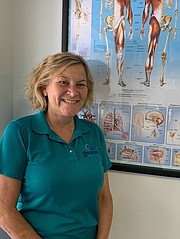By Hannah Foster-Middleton
BSc (Hons) Physiotherapy, MCSP, SRP
The shoulder is the most moveable joint in the human body. It is composed of a group of four muscles and their tendons. This group is called the rotator cuff, a group of muscles which connect the shoulder to the arm and it is the rotator cuff which gives the shoulder such a wide range of movement. If the rotator cuff is damaged in any way caused by injury or the aging process it might include swelling, or bone changes around this area and cause pain. Pain can occur when raising the arm above your head or moving the arm back and forth. Sometimes shoulder pain may be due to a problem in another area of the body, such as the neck or lungs. This is called referred pain and usually causes pain at rest but no worsening of pain when moving the shoulder.
There are many causes for shoulder pain but the most common is caused by bursitis, when the tendons to the rotator cuff become trapped under the bony area of the shoulder. These tendons become inflamed and damaged resulting in the condition known as tendinitis or bursitis. Bursae are small fluid-filled sacs that reduce friction between the moving parts in your shoulder joint.
Bursitis of the shoulder occurs when there is swelling and redness between the top of the arm bone and the tip of the shoulder due to lack of sufficient space.
However, there are several other causes for shoulder pain. Bursitis for instance, which is inflammation of a fluid-filled sac (bursa) that normally protects the joint and helps it move smoothly. Frozen shoulder occurs when the muscles, tendons, and ligaments inside the shoulder become stiff making movement difficult and painful. Sometimes injury is caused by overuse or injury of nearby tendons, such as the bicep muscles of the arms; tears of the rotator cuff tendons; poor shoulder posture; arthritis in the shoulder joint; bone spurs in the shoulder area; a broken shoulder bone; dislocation of the shoulder or shoulder separation.
Rotator cuff injuries causing impingement are very often incurred by manual labourers, weight lifters, body builders or baseball pitchers. A frozen shoulder, known as adhesive capsulitis, happens when the connective tissue becomes thickened and tight and causes stiffness and pain. This can occur when the shoulder has been immobilised for a period of time either through surgery or because of injury and this can be serious if left untreated. Tendinitis is a very common condition that can be treated by a physiotherapist for pain relief. It causes inflammation and usually affects people who take part in physical activities, or at work at a job that requires them to use many repetitive motions on a daily basis. For example, if you are an athlete who plays tennis, or a professional painter, you could be at a greater risk for developing tendinitis. This is because you make the same repetitive motions every day to play your sport or do your job. Tendon tears often occur through our natural aging process, overuse or random injury. Regardless of whether a patient has experienced a partial or full tendon tear, the pain can be searing. More than 90 percent of tendon injuries are long term in nature, and 33-90 percent of these chronic rupture symptoms go away without surgery.
Almost all, if not all, of these conditions can be helped or cured dramatically with physiotherapy. Your therapist will be able to make a diagnosis, manage your pain using a number of different non-invasive treatment options and prescribe a series of exercises specifically for your condition. You may also be asked to do some home care including icing, exercise and rest possibly using a sling. It might also be suggested that you rest the shoulder for a period of time and slowly return to normal activities.
• For questions and comments, call Hannah Foster-Middleton at 356 4806, e-mail genesisphysiotherapy@gmail.com, or visit www.physiotherapybahamas. com.





Comments
Use the comment form below to begin a discussion about this content.
Sign in to comment
OpenID